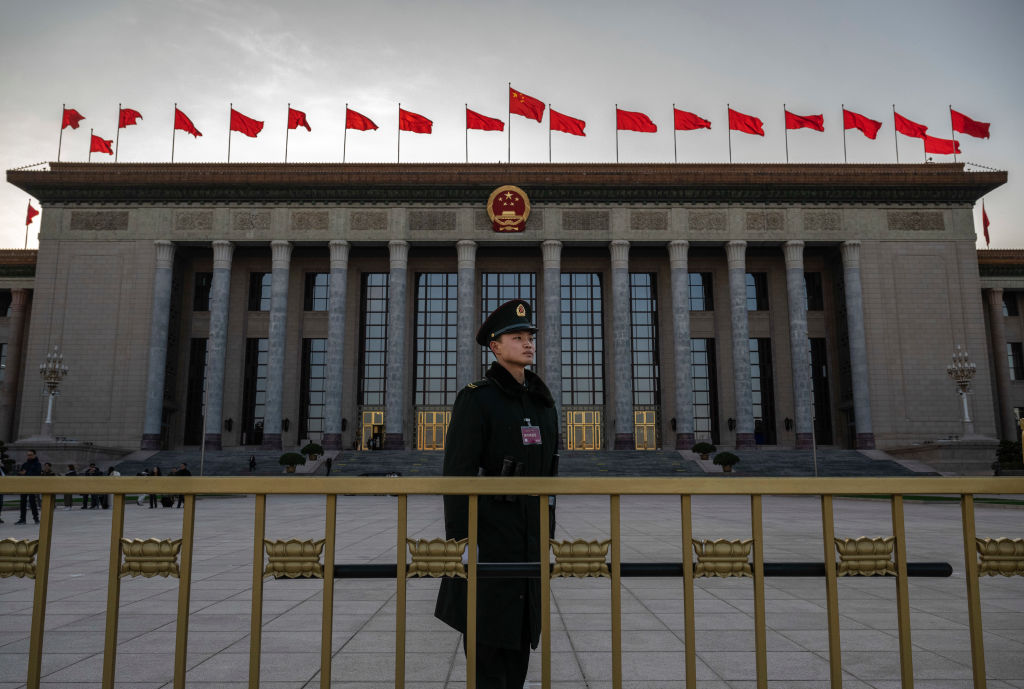
Chinese officials, their boss Xi Jinping likes to say, should “tell China’s story well.” So when that story isn’t a good one, it’s perhaps natural that they shouldn’t say much of anything, which may explain why this year’s National People’s Congress (NPC) annual rubberstamp parliament has proven tedious even by its own dismal standards.
Dressed in navy suit and crimson tie, Premier Li Qiang rattled off his highly anticipated Work Report on Tuesday in just 50 minutes, the shortest time since 2001. And by ditching the customary closing press conference—a highly choreographed affair at the best of times—Li didn’t portray much confidence that this particular story would stand up to even cursory scrutiny.
Li’s speech, which reviews the nation’s economic health while setting new goals and targets, proved to be an almost carbon copy of his predecessor’s last year, down to the same projected growth target of “about 5%.” Although he unveiled a 7.2% increase in military spending, $139 billion in “ultra long-term” special bonds, and $1.4 billion towards upgrading industries and modernizing manufacturing, the tone was very much business as usual.
“The Chinese people have the courage, wisdom, to overcome any difficulties or obstacles,” Li said. “China’s development will surely endure storms and plough through the waves, [and] the future is promising.”
Few are convinced. China’s bourse has lost some $4 trillion in value since its 2021 peak, foreign investment is abandoning the country, while a festering real estate crisis threatens to wipe out the savings of millions and shave 1% off GDP for the rest of the decade, according to Capital Economics. Beijing continues to flirt with deflation, a record number of young people are without work, consumer confidence has barely recovered from pandemic-related lockdowns, and local authorities are drowning in debt.
“The way things are being handled suggests that Xi Jinping does realize that the economy is not doing well, that challenges are being faced, but he is not seeing a crisis,” says Steve Tsang, director of the SOAS China Institute at the University of London. “But I think it’s head in the sand rather than true confidence.”
The most significant shift so far unveiled at the NPC has been an enhanced focus on investment in technology and developing emerging industries, with R&D spending set to rise by 10%. “Digital technology is really top of the agenda,” says Nis Grünberg, lead analyst for politics and society at the Berlin-based Mercator Institute for China Studies. “China is trying to develop its way out of economic hardship.”
That sets the stage for more conflict with the U.S. Despite a thawing of bilateral ties since Xi and President Joe Biden met on the sidelines of the APEC summit in San Francisco in November, the White House has continued to expand export controls on sensitive technology. It was a topic that prompted the most colorful language from Foreign Minister Wang Yi during a press conference on Thursday, when he accused the U.S. of “devising various tactics to suppress China” via a “unilateral sanctions list reaching bewildering levels of unfathomable absurdity.”
Still, Wang’s histrionics betray a lack of introspection that will worry businesses in China and all those who rely on its $17.52 trillion economy. Of course, export controls are clearly unhelpful to China in the near-term, though there is a growing school of thought that they will ultimately backfire by spurring indigenous innovation.
What has been more glaring is the complete lack of attention to socio-economic restructuring, such as wealth redistribution, boosting wages, growing household incomes, progressive income tax, implementing property taxes, or raising retirement ages—necessary reforms that are perennially discussed yet never implemented.
“There’s a growing disconnect between official rhetoric and the realities felt by the common man and woman on the ground,” says Wen-ti Sung, a political scientist based in Taiwan for the Australian National University. “That’s a concern for the business community.”
Some were hoping in vain for movement on liberalizing investment in healthcare and telecoms sectors, for instance, as well as laws to help private businesses collect unpaid debts. But in many ways, inertia was inevitable.
Key economic policies are typically decided by the Chinese Communist Party’s (CCP) Third Plenum, a five-yearly plenary session of its Central Committee that is especially geared toward economic development. The Third Plenum should typically have happened by October and the fact that it still hasn’t is unprecedented and a subject of no little conjecture.
At the top level, it signifies a further shift of power away from the institutions of government towards the party, and Xi above all. As such, the NPC’s 2,960 parliamentarians from across China have little choice but to tread water. And in a time of undoubted economic crisis, that’s not a story that’s pleasing to hear.
“This NPC was going to be dull because the Third Plenum has not happened,” says Tsang. “So economic directions have not yet been decided by the ‘big man’—and there’s not much the Premier or the rest of the government can do about it.”
More Must-Reads from TIME
- Cybersecurity Experts Are Sounding the Alarm on DOGE
- Meet the 2025 Women of the Year
- The Harsh Truth About Disability Inclusion
- Why Do More Young Adults Have Cancer?
- Colman Domingo Leads With Radical Love
- How to Get Better at Doing Things Alone
- Michelle Zauner Stares Down the Darkness
Write to Charlie Campbell at charlie.campbell@time.com